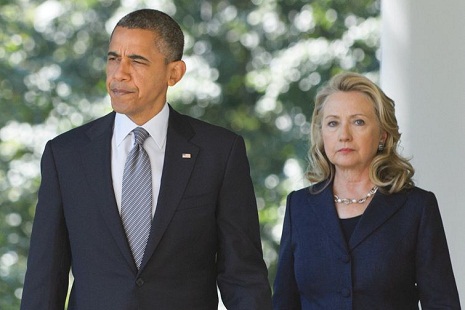Hillary used to attack Obama for being "soft on crime." Now she`s helping him look softer.

That`s ironic, since the last time Clinton ran for president, she explicitly attacked then-competitor Senator Barack Obama for being soft on crime. After the Iowa primary, her campaign said Obama`s opposition to mandatory minimum prison sentences was an example of his out-of-touch liberalism. In yesterday`s speech, of course, Clinton herself said, "Measures that I and so many others have championed to reform arbitrary mandatory minimum sentences are long overdue."
But the clearest indication of just how quickly the politics of criminal justice reform have changed in the Democratic Party is that Clinton`s speech is helping the Obama administration take credit for a sentencing reform it wasn`t even responsible for — and was sort of ambivalent about.
Clinton said:
I`ve been encouraged to see changes that I supported as Senator to reduce the unjust federal sentencing disparity between crack and powder cocaine crimes finally become law.
And last year, the Sentencing Commission reduced recommended prison terms for some drug crimes.
President Obama and former Attorney General Holder have led the way with important additional steps. And I am looking forward to our new Attorney General, Loretta Lynch, carrying this work forward.
This looks like two events. But it`s actually four.
Clinton is explicitly referring to decisions that told judges to give shorter sentences to future drug offenders. The Obama administration was responsible for the first one, by signing the Fair Sentencing Act in 2010. Since the US Sentencing Commission is an independent body, the administration doesn`t get credit for its "drugs minus two" sentencing recommendations, though the Department of Justice did testify in support of them.
But in both of these cases, the reductions also got applied retroactively by the Sentencing Commission: people who were serving sentences in federal prison based on the old laws could petition to get their sentences recalculated under the new laws. When it comes to reducing the federal prison population, retroactivity was a huge deal — almost half of all federal drug prisoners are eligible to apply for sentence reductions.
The Obama administration didn`t exactly oppose making the sentence reductions retroactive. But it wasn`t exactly a champion, either. When the Sentencing Commission considered making the Fair Sentencing Act retroactive, Attorney General Eric Holder pointedly refused to take a position one way or the other. And when they considered retroactivity for the "drugs minus two" sentence reductions last year, Holder`s office endorsed a limited version of the plan — about half the size of what the Sentencing Commission eventually agreed to — but wanted a lot more limits on who should be able to ask for a reduction.
Clinton`s right to point to these two reforms: they`ve arguably done more to reverse federal mass incarceration than any other Obama administration effort. And by implying that Obama and Holder themselves deserve credit, Clinton isn`t putting words in their mouths — these are absolutely reforms that the White House has come to embrace as Obama, Holder and other Democrats have become more outspoken about criminal justice reform in the last year. It`s entirely possible that Holder wanted crack cocaine prisoners in 2011 to get sentence reductions, but felt he couldn`t take that position officially yet. Now it`s clear that many voters — especially Democrats — see reducing incarceration as a legacy to be proud of. And Clinton is helping Obama and his White House own it.















































